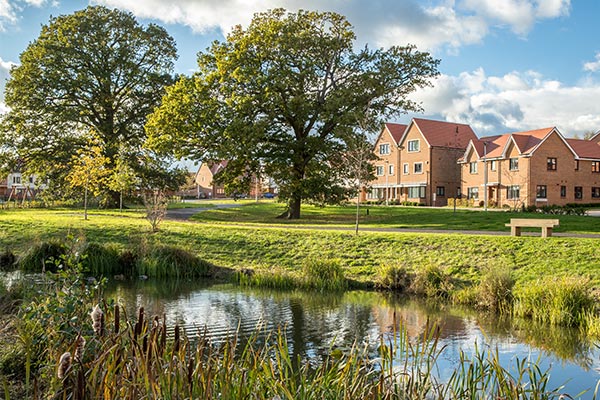Award-winning housebuilder Crest Nicholson has announced that the science-based targets set by the business in 2022 have now been validated by the Science Based Targets initiative (SBTi). It is the first UK housebuilder to have its science-based net-zero target approved by the SBTi, reflecting its commitment to reducing greenhouse gas (GHG) emissions across the value chain.
The SBTi validation confirms that the targets set by Crest Nicholson are based on the latest climate science, supporting the ambition to limit global temperature rise to 1.5°C in line with the Paris Agreement. Crest Nicholson’s target to reach net-zero GHG emissions across the value chain by 2045 is supported by a series of commitments across its scope 1, 2 and 3 emissions.
Net-zero target
- Reach net-zero GHG emissions across the value chain by 2045 from a 2019 base year.
Near term targets
- Reduce absolute scope 1 and 2 GHG emissions 60% by 2030 from a 2019 base year*
- Reduce scope 3 GHG emissions 55% per square meter completed floor area by 2030 from a 2019 base year.
Long term targets
- Reduce absolute scope 1 and 2 GHG emissions 90% by 2045 from a 2019 base year*
- Reduce scope 3 GHG emissions 97% per square meter completed floor area by 2045 from a 2019 base year.
Achieving net-zero emissions across the value chain will be a significant challenge, requiring effective collaboration and coordinated action across the supply chain and wider industry.
Crest Nicholson is already making progress in reducing GHG emissions. Steps taken to reduce scope 1 and 2 emissions include driving the efficient use of plant and equipment on site, trialling lower carbon technologies including hybrid generators and an electric telehandler, using alternative low carbon fuels and increasing the procurement of renewable electricity. To reduce emissions relating to scope 3, Crest Nicholson continuously reviews the design, technologies and materials used within its homes. It is also a member of the Future Homes Hub’s Embodied and Whole Life Carbon Workgroup, which is developing guidance, tools and an implementation plan to support an industry-wide reduction in whole life carbon.
Mark Kershaw, Group Head of Sustainability at Crest Nicholson:
“The validation of our targets by the Science Based Targets initiative ensures that our ambitions are aligned with the latest climate science and will contribute towards tackling the climate crisis.
At Crest Nicholson, we continue to challenge ourselves to reduce emissions across our operations. We look forward to collaborating with our suppliers, partners and the wider industry to accelerate the adoption of more sustainable practices and take the required steps together towards achieving net-zero.”
Peter Truscott, Chief Executive at Crest Nicholson:
“We are proud to be the first UK housebuilder to have our science-based net-zero target approved by the Science Based Targets initiative. Our industry has a pivotal role to play in responding to climate change and we look forward to continuing to drive the decarbonisation of our operations and wider value chain.”
*The target boundary includes biogenic land-related emissions and removals from bioenergy feedstocks.
About the Science Based Targets initiative
The Science Based Targets initiative (SBTi) is a global body enabling businesses to set ambitious emissions reductions targets in line with the latest climate science. It is focused on accelerating companies across the world to halve emissions before 2030 and achieve net-zero emissions before 2050.
The initiative is a collaboration between CDP, the United Nations Global Compact, World Resources Institute (WRI) and the World Wide Fund for Nature (WWF) and one of the We Mean Business Coalition commitments. The SBTi defines and promotes best practice in science-based target setting, offers resources and guidance to reduce barriers to adoption, and independently assesses and approves companies’ targets. www.sciencebasedtargets.org @sciencetargets
Back




